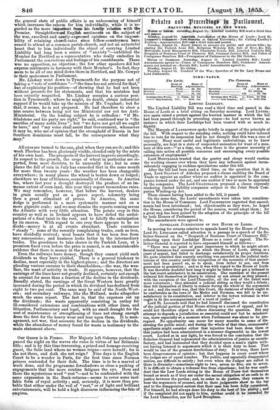All eyes are turned to the sun, glad when they
can see it; and this week Phcebns has been gloriously visible, clouded only by the mists of his own heat. The prospects of the harvest improve accordingly. in respect to the growth, the crops of wheat in particular are re- ported, from most districts, to be unusually fine ; but in some places the fall of rain in July has exceeded that in the same month for more than twenty years : the weather has been changeable everywhere ; in many places the wheat is beaten down or lodged; elsewhere we hear of thinness, occasionally of disease. In America too, where last year a drought destroyed the produce of an im- mense extent of corn-land, this year they report tremendous rains. We may remember, however, that before the harvest, dealers in grain usually put on a grave aspect, solemnity being then a great stimulant of prices. In America, the same dodge is performed in a more systematic manner and on a more gigantic scale ; and we may dismiss the reports coming across the Atlantic with very little attention. The potato crop in this country as well as in -Ireland appears to have defied the antici- pations of a final taint in the root, and to falsify the anticipation by its success. With regard to one crop there appears to be no doubt—money is at all events abundant. Trade continues " steady " : some of the recently complaining trades, such as iron, have decidedly revived; wool boasts that it has been free from any concussions ; and business looks better in the intermediary trades. The greediness to take shares in the Turkish Loan, at a premium fixed even before the price is named, is an unmistakeable evidence that there is money in the pocket.
Even the railways have money, though they cannot yield such dividends as they have yielded. There is a general tendency to decline, most especially in the highest places ; and the directors are pleading various excuses to their shareholders,—the war, the wea- ther, the want of activity in trade. It appears, however, that the earnings of the lines have not greatly declined, certainly not enough to account for more than a fraction of the decline in the dividends. Broadly stated, the earnings of the Great Western have greatly increased during the period in which its dividend has declined from eight to two per cent The same may be said of the North-West- ern; and seoondary railways, like the Midland, make altogether mush the same report. The fact is, that the expenses eat up the dividends ; the waste apparently consisting in outlay for ill-considered extensions and combinations with other lines, and litigation, Parliamentary and legal, with no small draught for the oost of maintenance or strengthening of lines not strong enough from the first for the heavy wear and tear upon them. It is man- agement, not war, that accounts for the decline in the dividends, while the abundance of money found for waste is testimony to the main statement above.


























 Previous page
Previous page